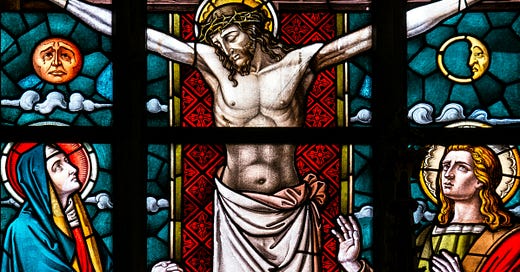When various soteriologies and eschatologies are compared and contrasted, lauded or criticized, one of the issues concerns if the vision is "exclusive" versus "inclusive."
Consider, for example, the Biblical claim about Jesus from Acts 4.12: "There is salvation in no one else, for there is no other name under heaven given to people by which we must be saved.” That is an exclusive claim about Jesus. Salvation can be found nowhere else. Consider also Jesus' self-statement: "I am the way, the truth, and the life. No one comes to the father except through me." Again, a very exclusive claim.
It is generally assumed that such exclusive claims rule out inclusive soteriologies and eschatologies. And it is true that some inclusive soteriologies and eschatologies explicitly reject exclusive claims about Jesus. For example, there is the pluralistic view that world religions and faith traditions are each different paths going up the same mountain. In such a conception, Jesus is just one among many paths
All that to say, there are particular visions of exclusivity and inclusivity that do contradict each other. But exclusivity and inclusivity don't have to be contradictions. You can make an exclusive claim about Jesus while still espousing an inclusive vision. Consider Philippians 2:9-11:
For this reason God highly exalted him
and gave him the name
that is above every name,
so that at the name of Jesus
every knee will bow—
in heaven and on earth
and under the earth—
and every tongue will confess
that Jesus Christ is Lord,
to the glory of God the Father.
Notice how the vision is both exclusive and inclusive. Every tongue will confess Jesus. Jesus is the door and everyone moves through that door.
Consider also the Christ-Hymn of Colossians 1:
For everything was created by him,
in heaven and on earth,
the visible and the invisible,
whether thrones or dominions
or rulers or authorities—
all things have been created through him and for him.
He is before all things,
and by him all things hold together.
He is also the head of the body, the church;
he is the beginning,
the firstborn from the dead,
so that he might come to have
first place in everything.
For God was pleased to have
all his fullness dwell in him,
and through him to reconcile
everything to himself,
whether things on earth or things in heaven,
by making peace
through his blood, shed on the cross.
Again, an exclusive claim is being made about Christ, but that exclusive claim is made inclusive and universal. By him all things hold together, and through him everything is reconciled to God.
My point here isn't to tell you what to think about soteriology or eschatology. My goal is simply to clear up a very common misconception. Inclusive and hopeful visions of soteriology or eschatology are not necessarily opposed to making exclusive claims about Jesus. You can have exclusivity and inclusivity at the same time.




Richard, I wonder if there is a miscommunication between the exclusive and inclusive sides? I often hear the exclusivity claims being made about our need to choose Jesus. While inclusive claims announce that God has already chosen us.
Could our social-psychology be at play? As humans we want to find belonging which is most salient in smaller and well defined groups. So we reduce the circle to diffentiate our family, tribe, political party, or denomination. In so doing, we expect others to find God with our tribe's language? Whereas God does not do that, but sees all humanity as made in God's image as the main identifier of belonging.
God is pretty hidden now, at least from most people. Various religious traditions have a lot of great stuff to say and teach (and some awful stuff!). Buddhism strikes me as particularly wise, its wisest stuff as wise as the best stuff in Christianity (from my POV). Presumably some time after death, if there is an afterlife, God and Jesus will be less hidden, and the truth will be evident to every being. Let's assume that it becomes clear to anyone that Jesus is the Son figure in a Trinitarian God, and is totally loving and wanting to love and be loved by everyone. Well who is going to resist that, even those who were committed Buddhists on earth? So in the end, totally inclusive. And in the meantime, when God and Christ are largely hidden, good Buddhists add tremendous value to the world. So it could be true both that all paths up the mountain lead to the summit, and Christ is perched on that summit.